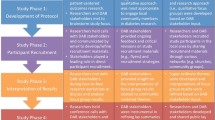Abstract
The growing incidence of diabetes among Hispanics is a serious public health concern. To identify factors that influence diabetes self-management in Hispanics, qualitative data gathered through five focus group interviews was examined using grounded theory methods. Four major themes emerged which were perceived by participants as enhancing or limiting factors: (1) access to resources, (2) struggle with diet, (3) self-efficacy, and (4) social support. The family’s role as a determinant of diabetes self-management emerged as the underlying sub-theme to all four themes and underscores its importance among Hispanics living with diabetes. Results suggest that for the family to be an enhancing factor, health care providers need to educate, empower, and include the family in diabetes management and prevention. Programs which aim to improve the practice of self-management should incorporate the sociocultural and socioeconomic context in which Hispanics with diabetes live.

Similar content being viewed by others
References
Narayan K, Boyle JP, Geiss LS, Saaddine JB, Thompson TJ. Impact of recent increase in incidence on future diabetes burden. Diabetes Care. 2006;29(9):2114–6.
Humes KR, Jones NA, Ramirez RR. Overview of race and Hispanic origin 2010: 2010 census briefs. US Census Bureau; 2011. p. 3. Available at: http://www.census.gov/prod/cen2010/briefs/c2010br-02.pdf. Accessed 30 Oct 2011.
CDC Health Disparities and Inequalities Report—United States, 2011. Centers for Disease Control and Prevention: morbidity and mortality weekly report. January 14, 2011; (60). Available at: http://www.cdc.gov/mmwr/pdf/other/su6001.pdf. Accessed 30 Oct 2011.
Centers for Disease Control and Prevention. Prevalence of diabetes among Hispanics—selected areas, 1998—2002. MMWR. October 15, 2004;53(40):941–4. Available at: http://www.cdc.gov/mmwr/preview/mmwrhtml/mm5340a3.htm. Accessed 17 Nov 2011.
Centers for Disease Control and Prevention: National Diabetes Surveillance System. 2008. Available at: http://apps.nccd.cdc.gov/DDTSTRS/default.aspx. Accessed 28 Oct 2011.
The Healthy Communities Network: Healthy San Bernardino County. Disparities dashboard. 2009. Available at: http://www.healthysanbernardinocounty.org. Accessed 31 Oct 2011.
San Bernardino County 2010 Community Indicators Report, Board of Supervisors Country of San Bernardino. 2010. Available at: http://www.sbcounty.gov/iUploads/CAO/Feature/Content/ComIndicatorsReport10Rev.pdf. Accessed 10 Nov 2011.
US Department of Health and Human Services Office of Minority Health, Hispanic/Latino Profile. 2009. Available at: http://www.minorityhealth.hhs.gov/templates/browse.aspx?lvl=2&lvlID=54. Accessed 13 Jan 2012.
Davidoff AJ, Kenny GM. Uninsured Americans with Chronic Health Conditions. Key Findings from the National Health Interview Survey. Urban Institute, University of Maryland, Baltimore County. May 2, 2005. Available at http://www.urban.org/uploadedpdf/411161_uninsured_americans.pdf. Accessed 13 Jan 2012.
PEW Hispanic Center. Demographic profile of hispanics in California, 2009. Available at http://www.pewhispanic.org/states/state/ca/. Accessed 13 Jan 2012.
Brown S, Garcia A, Kouzekanani K, Hanis C. Culturally competent diabetes self-management education for Mexican Americans. Diabetes Care [serial online]. 2002; 25(2):259. Available from: Academic Search Premier, Ipswich, MA. Accessed 4 Jan 2012.
Brown S, Garcia A, Winter M, Silva L, Brown A, Hanis C. Integrating education, group support, and case management for diabetic Hispanics. Ethn Dis. 2011;21(1):20–6.
Salto LM, Cordero-MacIntyre Z, Beeson L, Schulz E, Firek A, De Leon M. En balance participants decrease dietary fat and cholesterol intake as part of a culturally sensitive Hispanic diabetes education program. Diabetes Educ. 2011;37(2):239–53.
Rosal M, Ockene S, Restrepo A, et al. Randomized trial of a literacy-sensitive, culturally tailored diabetes self-management intervention for low-income Latinos. Diabetes Care. 2011;34:838–44.
McEwen MM, Pasvogel A, Gallegos G, Barrera L. Type 2 diabetes self-management social support intervention at the US-Mexico Border. Public Health Nurs. 2010;27(4):310–9.
Lopez-Class M, Jurkowski J. The limits of self-management: community and health care system barriers among Latinos with diabetes. J Hum Behav Soc Environ [serial online]. 2010;20(6):808–26. Available from: Academic Search Premier, Ipswich, MA. Accessed 2 Nov 2011.
Weinger K. Promoting diabetes self-management psychosocial issues and self-care. AJN. 2007;107(6):34–8.
Strauss A, Corbin J. Basics of qualitative research. Newbury Park, CA: Sage; 1990.
Charmaz K. Constructing grounded theory: a practical guide through qualitative analysis. Los Angeles: Sage; 2006.
Morgan D. Successful focus groups: advancing the state of the art. Newbury Park, CA: Sage; 1993.
Krueger R. The future of focus groups. Qual Health Res. 1995;5(4):524.
Kitzinger J. The methodology of focus groups: the importance of interaction between research participants. Sociol Health Ill. 1994;16(1):103–21.
Gleeson-Kreig J, Bernal H, Wooley S. The role of social support in the self-management of diabetes mellitus among a Hispanic population. Public Health Nurs. 2002;19(3):215–22.
Glasgow RE, Toober DJ, Gillete C. Psychosocial barriers to diabetes self-management and quality of life. Diabetes Spectr. 2001;14(1):33–40.
National Diabetes Education Program. Guiding principles for diabetes care. NIH. April 2009; 09-4343. Available at: http://ndep.nih.gov/publications/PublicationDetail.aspx?PubId=108#page6. Accessed 19 Oct 2011.
Sarkar U, Fisher L, Schillinger D. Is self-efficacy associated with diabetes self-management across race/ethnicity and health literacy? Diabetes Care. 2006;29(4):823–9.
Vincent D. Culturally tailored education to promote lifestyle change in Mexican Americans with type 2 diabetes. J Am Acad Nurse Prac. 2009;21(9):520–7.
Rosal M, Olendzki B, Reed G, Gumieniak O, Scavron J, Ockene I. Diabetes self-management among low-income Spanish-speaking patients: a pilot study. Ann Behav Med. 2005;29(3):225–35.
Liao Y, Bang D, Cosgrove S, Dulin R, Harris Z, Stewart A, Taylor A, White S, Yatabe G, Liburd L, Giles W. Surveillance of Health Status in Minority Communities—Racial and Ethnic Approaches to Community Health Across the US (REACH US) Risk Factor Survey, United States, 2009. Morb Mortal Wkly Rep. 2011;60(SS06):1–41.
Author information
Authors and Affiliations
Corresponding author
Rights and permissions
About this article
Cite this article
Ramal, E., Petersen, A.B., Ingram, K.M. et al. Factors that Influence Diabetes Self-Management in Hispanics Living in Low Socioeconomic Neighborhoods in San Bernardino, California. J Immigrant Minority Health 14, 1090–1096 (2012). https://doi.org/10.1007/s10903-012-9601-y
Published:
Issue Date:
DOI: https://doi.org/10.1007/s10903-012-9601-y



